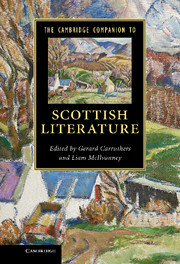Book contents
- Frontmatter
- Contents
- Notes on Contributors
- Acknowledgements
- Chronology
- Introduction
- 1 Scottish Literature before Scottish Literature
- 2 The Medieval Period
- 3 Reformation and Renaissance
- 4 The Aftermath of Union
- 5 Robert Burns
- 6 Enlightenment, Romanticism and the Scottish Canon
- 7 Scott and the Historical Novel
- 8 The Gaelic Tradition
- 9 Scottish Gothic
- 10 Victorian Scottish Literature
- 11 Robert Louis Stevenson
- 12 Hugh MacDiarmid and the Scottish Renaissance
- 13 Popular Fiction
- 14 Muriel Spark
- 15 The Glasgow Novel
- 16 ‘What is the language using us for?’
- 17 The Emergence of Scottish Studies
- 18 Otherworlds
- 19 Scottish Literature in Diaspora
- Index
- References
8 - The Gaelic Tradition
Published online by Cambridge University Press: 05 January 2013
- Frontmatter
- Contents
- Notes on Contributors
- Acknowledgements
- Chronology
- Introduction
- 1 Scottish Literature before Scottish Literature
- 2 The Medieval Period
- 3 Reformation and Renaissance
- 4 The Aftermath of Union
- 5 Robert Burns
- 6 Enlightenment, Romanticism and the Scottish Canon
- 7 Scott and the Historical Novel
- 8 The Gaelic Tradition
- 9 Scottish Gothic
- 10 Victorian Scottish Literature
- 11 Robert Louis Stevenson
- 12 Hugh MacDiarmid and the Scottish Renaissance
- 13 Popular Fiction
- 14 Muriel Spark
- 15 The Glasgow Novel
- 16 ‘What is the language using us for?’
- 17 The Emergence of Scottish Studies
- 18 Otherworlds
- 19 Scottish Literature in Diaspora
- Index
- References
Summary
The introduction to Alexander MacDonald’s 1751 Aiseirigh na Seann Chànain Albannaich [The Resurrection of the Old Scottish Language], the first secular publication in vernacular Scottish Gaelic, engages in celebration, advertisement and rapprochement. Coming only five years after the Battle of Culloden, the introduction carefully makes the case (in English) for Gaelic literature to be understood both in terms of classical and historical precedents, and as a part of the fabric of Scottish cultural life. MacDonald presents his collection of poems as entertainment for those who can read Gaelic, and a possible encouragement for those who cannot to learn; this may happen, he argues, if readers can be brought to see that Gaelic
might possibly contain in its bosom the charms of poetry and rhetoric, those two great sources of pleasure and persuasion, to which all other languages have owed their gradual advancement, and, in these improving times, their last polish and refinement.
MacDonald also proposes a future anthology, a
collection of poems of the same sort, in all kinds of poetry that have been in use amongst the most cultivated nations, from those of the earliest composition to modern times; their antiquity either proved by historical accounts, or ascertained by the best tradition; with a translation into ENGLISH verse, and critical observations on the nature of such writings, to render the work useful to those who do not understand the GALIC [sic] language.
- Type
- Chapter
- Information
- The Cambridge Companion to Scottish Literature , pp. 117 - 131Publisher: Cambridge University PressPrint publication year: 2012
References
- 13
- Cited by

